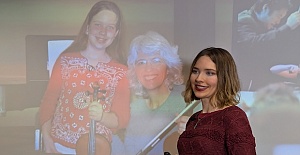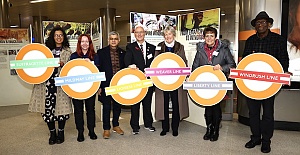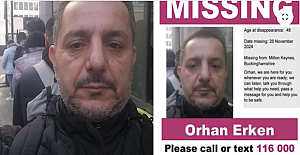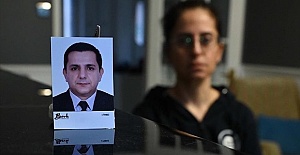“Bloody Christmas” in Cyprus 21-25th December 1963 50 Years Remembered in “The Day A Village Died” By Chris Green.
FIFTY years ago this week, agents for the Greek Orthodox Church began the implementation of the infamous Akritas Plan which amongst other things, called for the ‘removal of Turkish Cypriots from Cyprus by all forceable means’. The period of December 21st-15th has thus become known as “Bloody Christmas” and now, half a century on, this article re-visits a real human issue story that was first published by this columnist in the spring of 2010, comprising as it does of eye witness accounts together with the unique family photographs of just one of the many villages deliberately and brutally liquidated by the Eoka terrorists in their evil quest for Enosis in the period 1963/64 up until 1974.
Christmas came early to Küçük Kaymaklı and a bloody one it was too: Küçük Kaymaklı lies just south of Lefkoşa (Nicosia) and its location is now straddled by the UN buffer zone. Our story begins around the fourth day of what might be described as the ‘Makarios Purges’ which began in this area around December 18th 1963. As a thirteen-year-old boy Mehmet Abujuma lived with his family; his mother and father, five sisters with respective ages of four, seven, nine, ten and 21, a two year old brother and an elder brother, Salim, who was serving in the British Special Branch mainly at Dhekelia. There was also a sister in England and another in Lefkoşa (Nicosia). The first indications of the intentions of the Greeks was made known when a party of them shot up the local high school and the Ataturk memorial statue. The children, all terrified, were sent home from school. Eoka had positioned themselves on the Greek side of the main street and were shooting at the Turkish Cypriot dwellings. They were trapped in their house, sporadically under deadly fire which included bazooka rockets and bombs, for three days and nights. Indeed they were only able to go and use the privy (outside toilet) after nightfall.
In an ironic twist they were visited by the village midwife, Irenau, a Greek Cypriot neighbour who warned them of their impending doom at the hands of the Eoka terrorists. It is entirely due to this woman's humanitarian initiative, Mehmet believes, that his family and many of his fellow Turkish Cypriot neighbours were able to escape, convinced as he is, that the kindness of that lady saved many lives! Accordingly, but reluctantly, they abandoned their home, leaving all their possessions behind them. It was latterly discovered that theirs and other surrounding properties had been looted. They found a temporary place of refuge at a nearby village and later, under British military escort, the refugees got to Nicosia and stayed at Mehmet's aunts house. They were not alone as many other like refugees found their way to his aunt's house. In fact there were no fewer then 80 people living in the one house. In their case it was six to a bed: They were to remain there for three months.
It was during this chaotic time that one of Mehmet's uncles went missing. It later emerged that Eoka gunmen had entered the family home and explained to his uncle's wife that she and her children would not be ‘harmed’. They were, however, going to kill her husband in order that she and her children would suffer for the rest of their lives. His uncle was then forced to kneel and in true Eoka trademark style, was shot in the back, his wife and children being made to watch. The Eoka gunmen however got one thing right; the surviving family were indeed traumatised and remained so to this day. Mehmet recalls sadly that his aunt did actually lose her mental faculties. This family, like so many others, stood no chance. Whereas the Turkish Cypriots were attempting to fight back with a single shotgun and a single M1 rifle, the Eoka forces were heavily armed with weaponry contempoarary to the times.
Mehmet's father had become a naturalised British subject in 1948 while Mehmet's older brother was a serving officer in the British Special Branch. Being especially talented with Greek, Arabic and Turkish linguistic abilities, Selim was able to communicate with the diverse communities in Cyprus. Through these various connections Salim was able to obtain British passports for Mehmet's entire family. Accordingly during the early part of 1964 they were escorted form Nicosia to Limassol, then headed to England via Marseilles, Paris, and Dover. They ended up ultimately in Islington, North London. There they quickly settled in, and those old enough managed to obtain work very quickly. It is to be emphasised that at no time, either then or since, did Mehmet's family or any other Turkish Cypriot to his knowledge receive any state aid or financial benefits from the British government.
Returning to the period when the village was attacked and destroyed, many of the villagers fled on foot to a nearby Turkish village and for a time many people took shelter in open fields and even in a mosque. Being farmers some of the villagers went back to Küçük Kaymaklı to retrieve livestock; this proved to be fatal for all of them were executed by the Greek Cypriots. One relative who was a Muslim ‘hoca’ (holy man), who was around eighty years of age, had remained in Küçük Kaymaklı to take care of his severely disabled grandson who could not be moved at that time to safety. Both of them were dispatched in the usual manner practiced by Eoka.
Of that village in excess of 300 men, women and children are known to have been killed or are officially missing, in addition to which over 700 Turkish Cypriots were captured and imprisoned. Damage to Turkish Cypriot property was extensive with over 200 dwellings being destroyed and/or demolished. In the ensuing years much of the village has been restored but Mehmet's family home lies derelict in the central part of the UN buffer zone. The overall conflict of 1963 to 1974 saw 103 villages substantially destroyed and an excess of 30,000 Turkish Cypriots were rendered homeless, comprising some twenty-five percent of the Turkish Cypriot population of Cyprus at that time. And of course we know that during the ‘dark era’ of the period (1963-74) Turkish Cypriots were forced into enclaves occupying just three percent of the island.
Mehmet's wife, Harika, was a resident of Limassol at the time. As a five-year-old in 1964, she has scant recall of the details of the conflict. She does, however remember having to get on to a boat sailing for Israel then onwards to Italy, journeyed on through France right on to Calais and then a ferry to Dover from where she ultimately settled in Surrey with a family relative. Harika and Mehmet met each other in 1978 in London and were married the same year. There are two children from the marriage; a daughter of 29 and a son of 22 and now a grandchild of seven.
Many Turkish Cypriots, including Mehmet, decided to visit Cyprus in or around 1971-72 to search for relatives. They landed in Nicosia International Airport just years before it was abruptly forced to be closed, never to be used again. Ironically one of the fellow passengers on the aircraft was a relative of Harika! Mehmet and his friends, being young and boisterous, were talking animately in the Turkish language. The gentleman warned them in no uncertain terms not to speak Turkish when the plane landed in Nicosia. On arrival no Turkish Cypriot taxis were to be found; an uncomfortable few hours were spent searching for a ‘safe’ taxi. Eventually a driver was found who was willing to drive them to Turkish Cypriot territory in the sum of two pounds sterling each, additional to which a carton of cigarettes from each of the passengers was required for the for the considerable risk he was taking!
Salim, Mehmet's older brother, was forced to resign from the Special Branch due to ill health, to which he sadly ultimately succumbed. However, in retirement, Mehmet would regularly accompany his brother to Portsmouth to meet Sir Hugh Foot, the former British High Commissioner of Cyprus, whom his brother had served personally in his role as a bodyguard. Mehmet also recalls their visits to government house in Nicosia during the 1950s when they would be served Coca Cola, a product that was not available on the Turkish side of Cyprus in those days!
In the opinion of Mehmet Abujuma, the Turkish Cypriots who settled in England and where he has lived there for 46 years, have all in general worked hard as citizens of Britain. To his knowledge few have received state handouts or social security. Personally he is very proud to be both British and Turkish Cypriot. He is outspokenly opposed to the mass immigration to Britain in modern times. But ironically he and some friends considered emigrating to Australia and had completed the relevant application documentation:
But a relative, with great insight imparted these words of wisdom, "If you can't make it in this country, you won't make it in Australia". After a bit of thought, Mehmet and his friends decided to stay in England.
Today, Mehmet and Harika are regular visitors to the Turkish Republic of Northern Cyprus. Indeed, they have a holiday home in Karakum near to the Bellapais road. They also occasionally visit south Cyprus. However, to this day, Harika does not personally feel at all safe on the south side of the island by virtue of her being Turkish Cypriot by birth. Mehmet recalls in his village that the two communities lived generally quite separately, although before the troubles the two communities lived fairly cordially and socially. They used to play football against the Greek Cypriots, but because the Turkish Cypriots were in general far poorer than their counterparts, it would not be unusual for the Turkish to 'nick' the goal posts!
Asked to recall again the conflict of 1963 to 1974, Mehmet believes that the casualties of the Greeks must have been relatively light in 1963-64, but following the intervention by the Turkish Peace Forces after July 20, 1974 he considers the Greek casualties to have been very heavy indeed. However, an uncle who had assisted the British during the Cyprus emergency returned to Cyprus from England to volunteer for service with the Turkish army. After '63 Osman Gardash became `Mucahit` and was stationed at St Helarion. He was the sole survivor of a sustained Greek attack during which one of Mehmet’s friends was killed aged 24. Osman was willing to do national service for Turkey in the cause of the country of his birth and infant nurture.
Given the extent of his previous service in Cyprus, the Turkish army declined his offer but did enlist him to serve as a guide for the Turkish forces as he was intimately familiar with the territory. After the event he remarked upon the tremendous levels of Turkish casualties and in particular the area of St Helarion. He recalled to Mehmet having witnessed some 500 Turkish soldiers being loaded onto transport having paid the ultimate price in the proud service of the Republic of Turkey and for the protection of the lives of their Turkish Cypriot brothers. [1317 Turkish soldiers made the ultimate sacrifice during the Attila Operations of 1974]
When asked their opinion as to the future of Cyprus as an island, both were of the view that the island will remain divided, at the very least for a long, long time for in their opinion there is no obvious solution other than ‘Taksim’ and Recognition. Indeed for there to be any form of reconciliation it is critically important that the children are educated on both sides of the divide, equally and uniformly on the basis of established facts and more importantly the truth!
To highlight the many opportunities to end the divide, Mehmet drew upon the situation of the former Nicosia International Airport. Had the airport been rebuilt and both sides had use of it for their respective national airlines and other international airlines, perhaps that might have been a highly visible symbol of reconciliation following past conflicts. But the continued intransigence of the Greek side, whose stance is largely unchanged during the ensuing five decades is such, that a commonsense solution is way out of reach and the symbolism that would obtain from a shared airport facility was always too much to hope for.
Fifty years have now passed and whilst leaders come and leaders go, still no solution has been agreed upon. Rauf Denktaş embraced the Eternal Shadows on January 13th 2012 and his old sparring partner, Glafcos Clerides joined him on November 15th this year, ironically the date of the 30th anniversary of the Declaration of the Turkish Republic of Northern Cyprus. Today’s leaders are now negotiating over the wording of a joint statement ahead of yet more talks over the islands future which may be held early next year.
The smoke may have cleared from the years of armed conflict and the political fog that continues to shroud the island of Cyprus may never disburse, but one thing is quite clear and that is that the ‘sons and daughters’ of Denktas’ creation are now 30 years of age, and it is way past high time that they were allowed to fledge and to trade and prosper.
*originally published Spring 2010 and written in the tense current to that time.
Chris Green
For Avrupa Times


 After Nesil Caliskan a by-election will be held in Jubilee ward in Enfield
After Nesil Caliskan a by-election will be held in Jubilee ward in Enfield Publishing the analysis, Labour’s Cllr Ergin Erbil said Everybody in Enfield deserves basic rights
Publishing the analysis, Labour’s Cllr Ergin Erbil said Everybody in Enfield deserves basic rights Gaza-Israel conflict Statement from Cllr Ergin Erbil, Leader of Enfield Council
Gaza-Israel conflict Statement from Cllr Ergin Erbil, Leader of Enfield Council Cllr Ergin Erbil was elected as the new Leader of Enfield Council
Cllr Ergin Erbil was elected as the new Leader of Enfield Council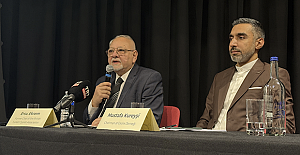 History of the Turkish Cypriot People symposium held in London
History of the Turkish Cypriot People symposium held in London Asia's most famous and powerful 100 women award given to WFPA President Naziya Bisenova
Asia's most famous and powerful 100 women award given to WFPA President Naziya Bisenova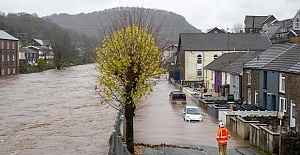 Death toll climbs to 5 as powerful Storm Bert batters Britain
Death toll climbs to 5 as powerful Storm Bert batters Britain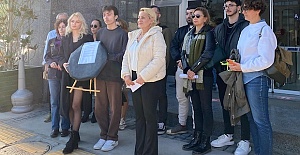 Turkish students are unable to obtain visas from the Italian Consulates
Turkish students are unable to obtain visas from the Italian Consulates Footballers are celebrating after Enfield Council officially opened a pitch
Footballers are celebrating after Enfield Council officially opened a pitch 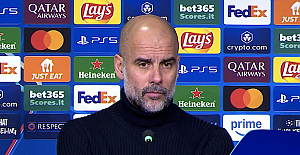 Pep Guardiola's Manchester City beaten by Juventus
Pep Guardiola's Manchester City beaten by Juventus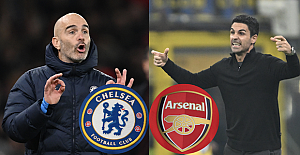 Chelsea to meet Arsenal in Sunday's London derby
Chelsea to meet Arsenal in Sunday's London derby Fenerbahce vs Manchester United Predicted line-ups! Jose Mourinho faces former side
Fenerbahce vs Manchester United Predicted line-ups! Jose Mourinho faces former side UK economy had zero growth between July and September
UK economy had zero growth between July and September Shape the future of housing services with The Enfield 500
Shape the future of housing services with The Enfield 500 DOUBLE-CAB PICKUPS TO BE CLASSED AS CARS UNDER NEW HMRC POLICY
DOUBLE-CAB PICKUPS TO BE CLASSED AS CARS UNDER NEW HMRC POLICY Guide to Selling Hoodies with Imprinted Book Quotes
Guide to Selling Hoodies with Imprinted Book Quotes







